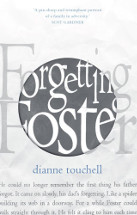Forgetting Foster by Dianne Touchell

Allen and Unwin, 2018. ISBN 9781760110796
(Age: 14+) Highly recommended. Themes: Memory, Memory Loss, Family,
Mental health. Dementia or early-onset Alzheimer's disease is
extremely distressing. In this beautiful book, full of pathos and
pain, we enter young Foster's world as his very young father, a
successful businessman, creative story teller and trusted and caring
father, slides down the steep slope of dementia, dropping memories
and certainty along the way as he slides into the abyss of
forgetfulness. In the process, Foster too (aged just 7 when we meet
him), also seems to be left behind and forgotten. But the reader
hears his voice and his pain as he grapples with losing the man he
loves and admires, and watches as he copes with the torment of his
changed family dynamics. The poignant naivete of Foster's
understanding is counterbalanced with the tortured grief responses
and uncertainty of his mother as she deals with the confused man
that her husband is becoming. (Her own historical recovery from a
brain injury following a car accident is an aching counterpoint to
the dementia slide). Everyone in this story is in pain, and their
ability to cope with the rapidity of change is challenged at every
turn. You cannot read this book without having sympathy for all the
characters. The older protagonists have their own struggles, and
sadly they do not have the emotional reserves to understand Foster's
hidden distress that the reader is experiencing with him!
Having a personal experience of a family member with some dementia
symptoms (albeit much older than Foster's father) and knowing of
people who have had early-onset Alzheimer's and who still had
dependent children, this book carried an extra layer of pathos. But
the impact of the story would be powerful without any personal
connections or experience, as every young reader will recognise the
pain of being ignored and will connect to their younger selves
through seeing the story through Foster's eyes. There are moments of
humour, but the experience is almost painful . . . like laughing
when you have wounded yourself.
This book is highly recommended and could be used for Senior
Secondary students, despite its very young main character and
simplicity. The perspective of the young naive voice could allow
this to work as a powerful paired text with books like: The Boy
in Striped Pyjamas, The Curious Incident of the Dog in the
Night-time, and Extremely Loud and Incredibly Close.
But it would also be good to consider the story's perspective from
the adult viewpoint and compare the powerful story of 'forgetting'
in Still Alice (book or movie).
Highly recommended for ages 14+. Note some maturity required,
because the topic is tragic.
Carolyn Hull